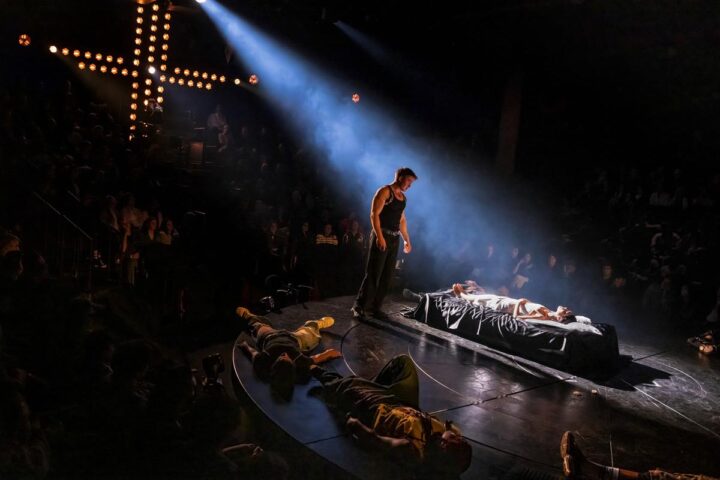“To have pain is to have certainty,” essayist Elaine Scarry wrote in The Body in Pain in 1985. “To hear about pain is to have doubt.” Even that shared certainty can’t quite quell the doubts among Infinite Life’s characters, visitors to a California clinic for people living with chronic pain. Sofi (Christina Kirk) is pretty certain that her bladder condition, which has decimated her sexual health, is the worst pain anyone there has experienced. Nelson (Pete Simpson) insists that his colon disease hurts worse than childbirth. No one has a verbal metric to accurately compare their pain so even sharing their experiences with other sufferers can be lonely. How can anyone know the silent pain of a body only you have ever lived in?
That’s one of the central questions at the tender, discomfiting heart of Infinite Life, but the knowledge that this is a new Annie Baker play could lead audiences to focus on the wrong thing. Baker, a Pulitzer Prize winner for The Flick, in which movie theater ushers spend lengthy sequences quietly sweeping up the empty cinema, has become synonymous with, if not notorious for, her hyperrealistic style with long stretches of silence and stillness.
But when a playwright becomes too closely linked with a distinctive pattern of storytelling, watching their work can become a dangerous game of studying less what they’re trying to say than how they’re saying it. “In Annie Baker’s Plays, Pay Attention to the Pauses,” read an illustrative headline earlier this month in the New York Times. There are pauses, yes, in Infinite Life, but they’re far from mere stylistic flourishes, as Baker’s beacon here is the search for language. That is, an attempt to find words to express the inexpressible.
The inexpressible, in this case, is pain. We meet six of the visitors at a fasting retreat aimed at combatting their chronic pain and illness. Some are on a weeks-long water-only fast, some only a juice cleanse. As they adjust to the fast, their nausea, lightheadedness, and fatigue distract them from the pain that brought them here and isn’t so easily described as those symptoms.
Baker’s rendering of her characters’ experience of pain and illness—or rather her rendering of their attempts to capture those experiences in language—is blazingly visceral, especially in those pauses. So much of what these visitors try to explain to each other are the knotty, naughty ways that their pain intersects or interferes with their pleasure, how their ideas of what the body is for warp and wither. And their emotional sorrow as they struggle to be understood ultimately stands in for the physical pain that fortunate, pain-free audience members can’t imagine. It’s the searingly silent search for words that ultimately expresses this agony most succinctly.
If Baker’s deployment of her trademark tools serves her characters well, it’s the larger structure that sometimes destabilizes Infinite Life. Baker allows for significant time jumps forward, announced efficiently by Kirk’s alternatingly blunt and distant Sofi to the audience, that sometimes seem arbitrary. A brief sequence in which Eileen (Marylouise Burke) narrates a scene in past tense seems like a random standalone instance of rule-breaking, compelling as Burke is. Indeed, it can be tough to track Baker’s taut constructions of scenes when the playwright starts loosening the reins on what kind of scenes she chooses to show us.
But much of what seems to be off-kilter about Infinite Life—the structural disorientation, the inexplicable shift in perspective—may be intentional, a reflection of the strangeness of the characters’ self-imposed fasting state and the constant pain they experience. The frequent gross-out graphic descriptions that characters offer of their most explosive symptoms often make the audience laugh, and while this is also the goal—“It seems like a joke, right?” Sofi asks Nelson after detailing her symptoms—Infinite Life doesn’t push back hard enough or precisely enough against the impulse to squirm away from the corporeal indignities that the fasters face.
But Infinite Life is often tremendously funny, especially when the cast revels in the awkwardness of strangers sharing endless days together. Director James Macdonald has assembled a who’s who of off-Broadway stalwarts including the effervescent, 82-year-old Burke, teetering between warm curiosity and nosiness; Kristine Nielsen, always delightful, trembling with an almost-spiritual sense of revelation in a monologue about coming to terms with infertility; and Brenda Pressley as a visitor hovering over her coloring book with a centered dignity. Perhaps best of all is Mia Katigbak (best known in New York as the prolific artistic producing director of the National Asian American Theatre Company) as the loquacious Yvette, a past success story for the clinic who’s hoping for another miracle: Her first fast made her tumor vanish altogether, and she’s back in desperate need of the same result.
As the quasi-protagonist, Kirk speaks often with an emotional placidity, a delivery just shy of monotone that makes Sofi the toughest character to crack, and, therefore, to warm to, even though her exasperation at having to put down her copy of Daniel Deronda in order to chit-chat is amusingly sympathetic. In her unpredictability, Sofi sometimes overshadows her less fleshed-out but more companionable acquaintances as they sunbathe. Baker seems to be aware of this in the play’s lovely final gesture, a moment brimming with awareness that these characters have only had the opportunity to reveal pieces of what they need and who they are to one another.
Macdonald’s gentle staging works most compellingly in tandem with Isabella Byrd’s crucial lighting; the transitions from near-total darkness to subtle blues of dusk to the overwhelming brightness plunging us into an early morning track both the passage of time and waves of discomfort and respite. In one late-evening scene, Sofi leans over the sleeping body of Ginnie (Nielsen) to study a coloring book page completed by Elaine (Pressley), her iPhone flashlight illuminating both the book and the snoozing Ginnie. It’s a lightly absurd stage picture that seems to speak to Baker’s spotlight on the body in all its stages of pleasure, pain, and pause.
Baker’s plays, pauses aside, do often invite audiences to force meaning onto moments where characters find none. It’s inevitable from the start that the relationships slowly unfolding will be fleeting acquaintances, and, especially early on, there’s the sense that, as viewers, we’re looking for more dramatic substance in the halting greetings and pro forma small talk than the characters are finding or desiring. And yet, the pressure to assign meaning onto the meaningless is a theme here too. Countering Eileen’s assertion that their chronic pain is some sort of divine message, Sofi confesses, “I guess if it means anything at all, then I don’t know if I can bear it.” If pain isn’t a punishment nor a challenge nor a blessing nor a curse nor a neatly plotted part of a person’s story, Baker suggests, if pain just is, hadn’t we ought to talk about it?
Infinite Life is now running at the Linda Gross Theater.
Since 2001, we've brought you uncompromising, candid takes on the world of film, music, television, video games, theater, and more. Independently owned and operated publications like Slant have been hit hard in recent years, but we’re committed to keeping our content free and accessible—meaning no paywalls or fees.
If you like what we do, please consider subscribing to our Patreon or making a donation.





